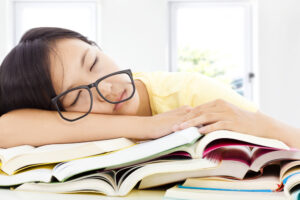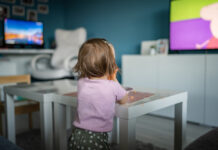“Seventy percent of young kids and 65 percent of adults get healthy sleep, but by their senior year, only about 15 percent of high-schoolers do. The average high-schooler sleeps 6½ hours a night, when they optimally need nine; and 1 in 5 teens sleeps five or fewer hours a night. By all accounts, adolescents are living in a state of severe and chronic sleep debt….
“In fact, sleep loss is implicated in almost every psychiatric diagnosis. Brain imaging studies have shown that sleep deprivation amps up the reactive, negative emotional centers of the brain, while the prefrontal cortex — which soothes and gives us perspective, judgment and emotional regulation — is less active.
“The real question is: How could we expect this level of sleep deprivation not to deepen the cracks in adolescents’ mental health?…
“The problem may sound intractable, but it’s not. Unlike many of the complicated factors making teens anxious or sad — global warming, the covid-19 pandemic, disconnection and loneliness — sleep is eminently fixable….”















